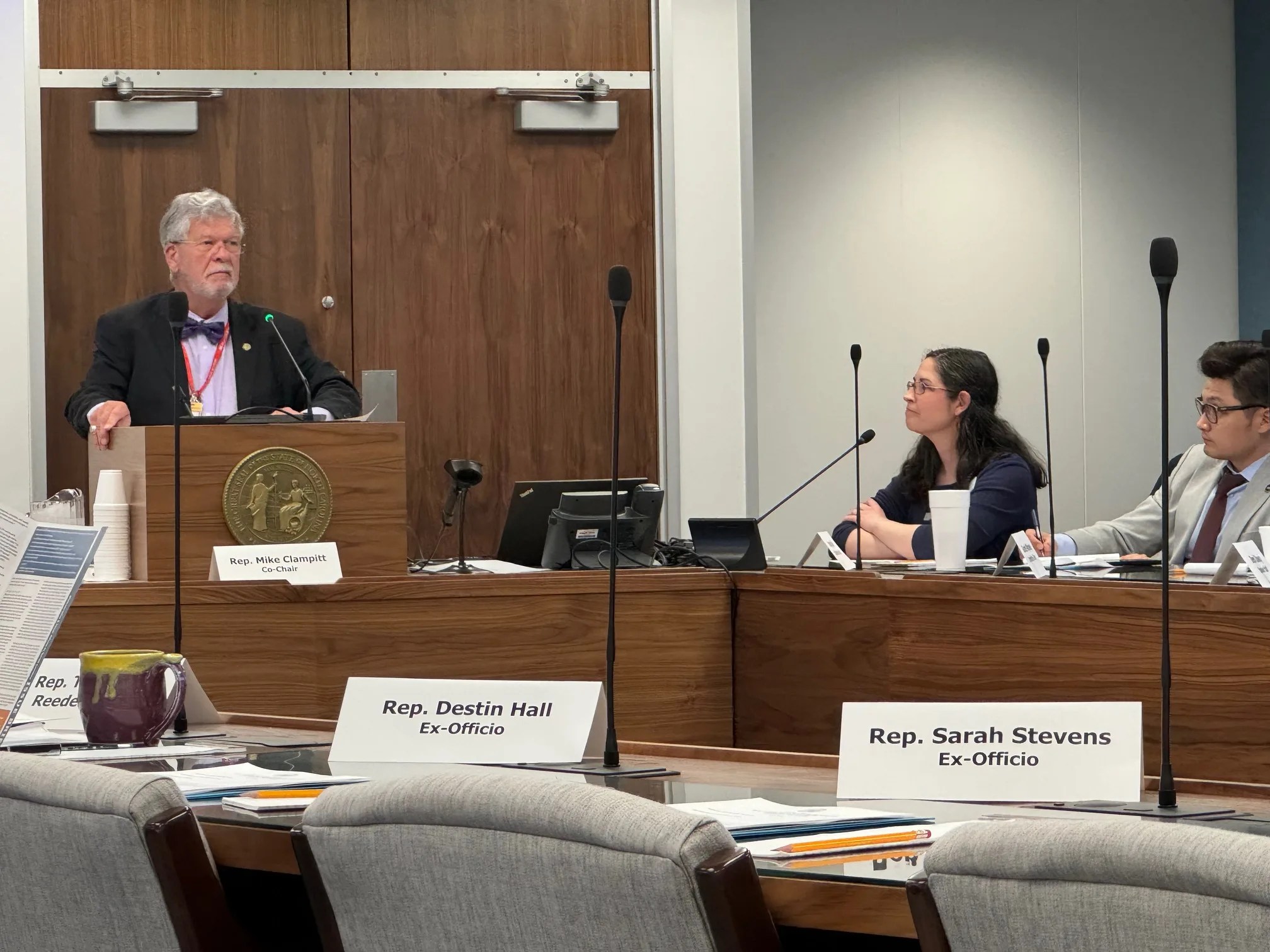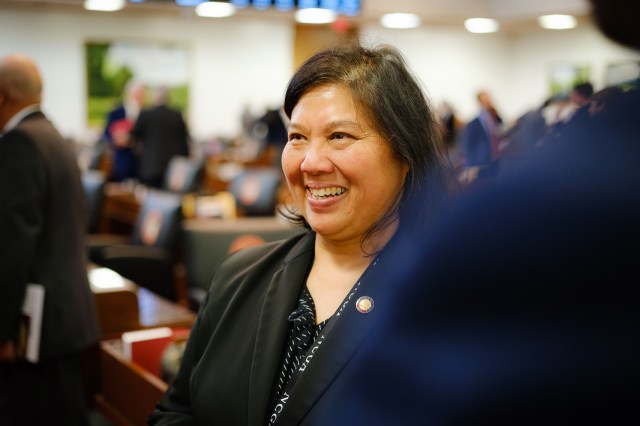Stay ahead of the curve as a political insider with deep policy analysis, daily briefings and policy-shaping tools.
Request a DemoAging North Carolina population requires additional legislative resources

Rep. Mike Clampitt, R-Swain, presides over the Families, Children and Aging Policy House Committee on Tuesday, May 21, 2024. (Matthew Sasser | State Affairs Pro NC)
- Elderly North Carolinians will outnumber the young within the next 20 years.
- Changing demographics drive the need for more legislative resources for elderly.
- Executive and legislative support for aging initiatives is on the upswing.
Laws, policies and procedures regarding healthy aging in North Carolina will only become more pertinent as the state’s elderly population outpaces its youth counterpart, say experts.
“We’re seeing a change in the growth [in North Carolinians over age 60],” Rep. Mike Clampitt, R-Swain, said to the Families, Children and Aging Policy House Committee on Tuesday. “We’re recognizing that by 2035, the senior population, and that’s including 60 on up in North Carolina, to be more than 18-year-olds.”
“In almost every county,” Brieanne Lyda-McDonald, a North Carolina Institute of Medicine (NCIOM) project manager, added.
North Carolina’s 65-and-older population is projected to increase by 50%, to 2.7 million from 1.8 million, between 2021 and 2041, according to ncIMPACT.
The committee gathered Tuesday afternoon to discuss recommendations from the NCIOM Task Force on Healthy Aging.
Social and economic recommendations from the task force include retaining material resources, ensuring safe and affordable housing and guaranteeing digital equity for older adults.
Over 48% of North Carolina private sector workers ages 18 to 64 in 2020 were employed by businesses that do not offer any type of retirement plan, according to an AARP fact sheet.
Lyda-McDonald said the average American worker has no retirement savings and many who do are not on track to have an adequate standard of living.
Rep. Jarrod Lowery, R-Robeson, encouraged his colleagues to check out House Bill 496, which would help ensure that small businesses have the resources to provide retirement benefits to their employees.
A request by the task force convened by NCIOM is for the General Assembly to establish a state-facilitated program to help businesses offer paycheck reductions for retirement savings if those businesses don’t offer a plan. Other requests are for the General Assembly to reduce eligibility requirements for income and assets for the Medicare Savings Programs and to support funding for consumer outreach.
The North Carolina Senior Tar Heel Legislature, created in 1993 to promote advocacy concerning aging issues, has issued a set of NCIOM-aligned legislative priorities for the 2023-24 sessions. Part of that request is an additional $8 million in recurring funds for Adult Protective Services and $1.26 million for senior centers.
In May 2023, Gov. Roy Cooper signed Executive Order No. 280, which directed action to make North Carolina an aging-friendly state.
“We’re seeing a lot of movement in this direction and excitement around aging in the state,” Lyda-McDonald said.
“What have you found in your studies to be the different challenges [of] aging in Raleigh or aging in a rural community?” Rep. Garland E. Pierce, D-Scotland, asked.
Lyda-McDonald said transportation issues and the lack of services in rural communities, contribute to the increased difficulties of aging in rural areas.
Rep. Pierce had a few additional questions for Mary Bethel, the chair of the NC Coalition on Aging’s board of directors. He asked if the state is positioned to accommodate elderly residents who wish to stay in the environment they are most comfortable with as they age.
“I don’t think we’re there, and I’ve been working in this field for [over 45 years],” Bethel said, adding that many of the issues touched on during the meeting, such as housing, elderly mental health and mobility, are critical to the state’s success.
“The demographics are driving this,” Bethel said. “We tried to do a plan on aging 22 years ago where we said North Carolina needs to be responsive. It pretty much fell on deaf ears, and the reason why: The demographics were not what they are today. With the demographics being what they are today, if we don’t begin to address some of these issues, they’re going to bite us in the rear end.”
For questions or comments, or to pass along story ideas, please write to Matthew Sasser at [email protected] or contact the NC Insider at [email protected] or @StateAffairsNC
Know the most important news affecting North-carolina
Get our free weekly newsletter that covers government, policy and politics that impact your everyday life—in 5 minutes or less.
Is North Carolina equipped to handle an aging population?
Stephanie Sudano, a former civil engineer in the town of Holly Springs, wasn’t trained in the field of medicine or nursing. None of her three sisters were either. But they have all become 24/7, on-call medical caregivers. Stephanie’s father had a stroke two years ago. The aftermath saw repeated illnesses cropping up, forcing extended hospital …
Global ‘Rights of Nature’ movement touches down in NC
Two bills introducing a novel legal concept have landed with a thud in the House Rules Committee, but supporters believe the idea might someday provide a better foundation for environmental law in the United States. House Bills 795 and 923 fall within a larger international movement known as Rights of Nature and would essentially give the Haw and Dan …
Mending the divide: Institute shapes future North Carolina leaders
A Confederate monument in Alamance County was dividing the community in half, sparking a war of words and strong emotions over the question of whether the statue was preserving history or honoring hate. At the time, Amy Galey, chair of the Alamance County Commission, called up an old friend for advice, hoping he might help …
Insider Afternoon Update for June 6, 2024
The conference report on the so-called “mask ban bill” sailed through the Senate without opposition Thursday, but only because every Democrat was absent from the chamber when the vote took place. The conference report adds an exemption for people who need to wear masks for medical reasons, but also makes a change to campaign financing law that …




